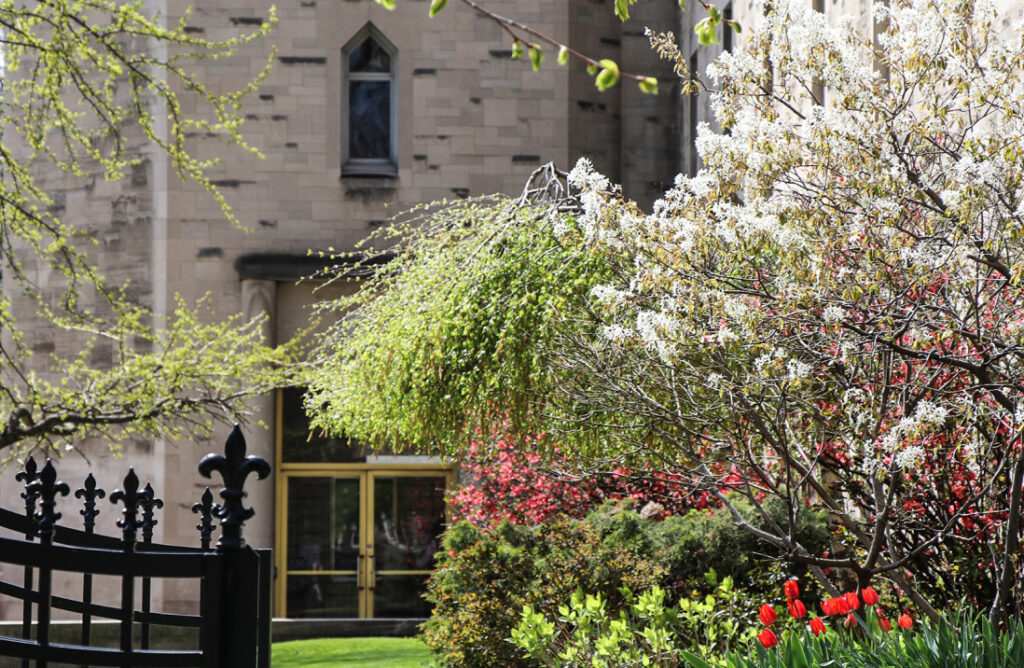Photo Credit: USMC Faculty of Theology
At Elliot Allen lecture, Catherine Keller suggests facing apocalypse with hope
Tony Xun, Contributor
For Dr. Catherine Keller, Christian theology offers a ray of hope in the face of climate apocalypse.
On February 3rd, St. Michael’s College hosted this semester’s Elliot Allen lecture. The Elliott Allen Institute for Theology and Ecology at St. Mike’s Faculty of Theology invited Dr. Catherine Keller from Drew University to lecture. Keller addressed the impending environmental catastrophe from a theological perspective, presenting the topic of her latest book: Facing Apocalypse: Climate, Democracy, and Other Last Chances.
Facing denialism and nihilism
Keller says the Four Horsemen of the Apocalypse – economic injustice, plague, conquest, and war – are reflected in our present situation. Putin’s invasion of Ukraine, the COVID-19 pandemic, and the threat of nuclear annihilation all resonate with the prophecies of the Book of Revelations.
From her environmental perspective, Keller considers climate change and ecological collapse as a major civilization threat that, when taken with global democratic backsliding and civil rights concerns in the United States, constitute a form of apocalypse.
To Keller, the danger lies in a false dichotomy in how we think about climate change. On the one hand, the “junk optimism” of climate change denialism and its reinforcement of neoliberal capitalism. On the other hand, a broad cultural nihilism that presents itself as the only alternative to denialism.
As a theologist, Keller identifies the power of religious symbolism in environmental discourse. The American evangelical right subscribes to a supernatural determinism, where the apocalypse is welcomed and environmental crises are inconsequential. Together with climate denialism, it sides with neoliberal capitalists who are interested in postponing systemic, state-level solutions.
Keller suggests that many on the political left have embraced in parallel an environmental determinism that sees apocalypse as inevitable. It is too late, they say, to effectively address climate change, so why bother? Nihilism sabotages its own environmental ethics, she says, allowing nihilists to vote in favor of lowering gas prices today because it matters little in the end.
Keller calls this attitude “tweeting through the apocalypse,” and it stalls culture in a “paralyzing pessimism of climate nihilism.”
Imaginative Realism
Through theology, Keller rejects the nihilism-denialism duality.
Apocalypse is not the end. In ancient Greek, apokálypsis meant “present closure,” and was used to describe the unveiling of a bride on her wedding night. In the Bible, too, the apocalypse did not portend ultimate destruction, Keller argues: the Book of Revelations ended not with any “single totality of termination,” but with a wedding banquet.
Keller suggests that this represents more than esoteric etymology. Doomsday predictions, she suggests, should not be met with irony or disdain, but nor do they herald the end of the world. Prophecy, in the Christian tradition, is not forecasting, but invites “dream reading.” Prophetic texts, she says, criticize “patterns of civilization,” but are not predictions of future fact.
Keller suggests that the future of climate change is similarly yet to be written. She is realistic about climate change. Yet, Keller still sees “New Jerusalem-ish glimmers of hope.”
She argues that those who practice “apocalyptic mindfulness” can find another way through faith.
Christians, she says, “are not pessimistic or optimistic: we are hopeful.”
In the United States, renewable energies represent a future of “holy possibilities.” Keller points to the increasing viability of electric vehicles, clean energy investments, and President Biden’s Inflation Reduction Act as a move in the “right direction.”
There is reason to hope for international cooperation in the face of crisis, Keller says. “Even as warming connects us all damningly, it may also awaken our global solidarity.”
Keller suggests that Christians concerned about the usages of religious symbols in public life should reclaim the language of apocalypse. She also claims that John the Apostle’s vision in the Book of Revelations is “profoundly anti-imperial.”
The Book of Revelations, she proposes, anticipates a multiplicity of possible futures in its dreamlike imagery, leaving room for faith in possibility.




